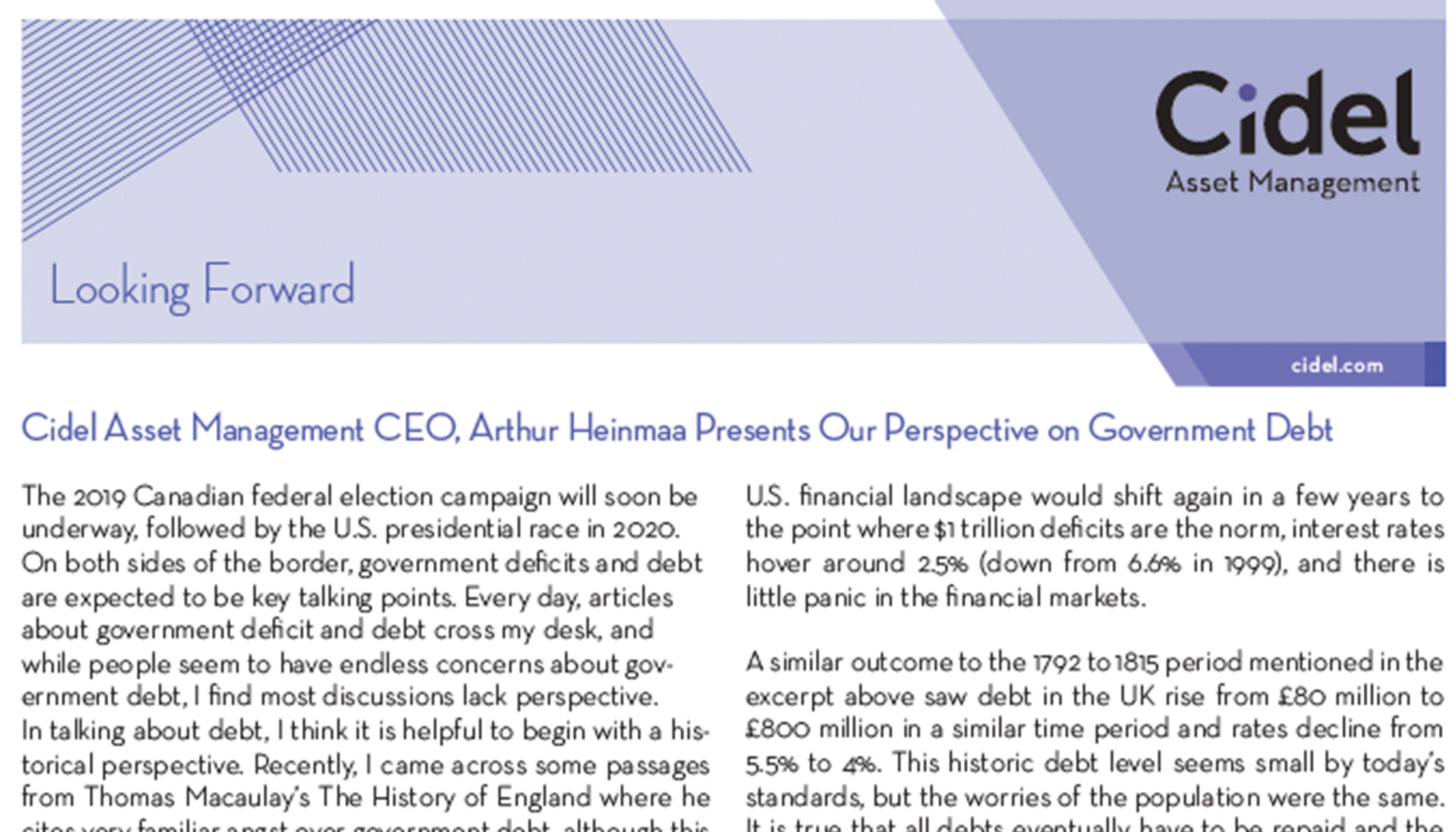
|
|
|
|
|
|

|
|
|
In our opinion, these were the most important stories in Q1… |
|
|

|
|
|
Equity markets around the world rallied strongly in the first quarter of 2019, rebounding from the sharp selloff witnessed in the fourth quarter of 2018. During the first quarter, the S&P 500 Index was up 13.3%, the TSX rose 13.1%, MSCI World was up 12.6% and MSCI Emerging Markets was up 11.1%. Within emerging markets, the largest gainers tended to be those markets with the worst performance in 2018. For example, China was up more than 30% in the first quarter after falling almost 28% last year. Credit markets recovered in Q1 as well, with a significant tightening in credit spreads across investment-grade and high-yield markets driving positive returns in the space. Investors should be mindful to put the market rally in context however, as it followed one of the worst-performing quarters in years. Even after taking the rebound into consideration, the S&P 500 remains below its peak level of late last summer. |
|
|

|
|
|
The past several years have delivered a significantly changing investment environment for investors. 2017 was characterized by historically low levels of volatility and strong returns across most asset classes. But 2018 saw the return of volatility to equity markets, and investors really had nowhere to hide as investments across a variety of asset classes and regions delivered negative returns on the year. So far in 2019, risk assets have rallied significantly across the board. |
|
|

|
|
|
Investment losses were not contained to equity markets in 2018. There is usually an asset class (or subset of an asset class) that delivers positive performance in a tough equity market year, but 2018 was the worst year in a century in terms of the percentage of investments experiencing a negative return across asset classes. According to Deutsche Bank, roughly 90% of investments measured across 70 different categories experienced negative returns last year. |
|
|

|
|
|
|
|
Fundamentally, economic data generally weakened during Q1. In manufacturing, purchasing managers indexes (PMIs) across various regions trended down quite sharply, although services and composite PMIs held up well. The global economy continues to expand and yet future expectations for global growth have gradually slowed, particularly for developed market economies. A combination of trade issues, increased sovereign risk (as in Italy, for example), and an increased risk of policy missteps have tempered global growth expectations for 2019 to approximately 3.5%. On the corporate side, expectations for profit growth have been declining as well, with the benefits of the U.S. corporate tax cuts now in the past and a current, more muted, economic backdrop.
|
|
|
 Interest rates continued their decline in Q1. In the U.S., the 10-year government bond yield fell from 2.68% to 2.41%, after peaking last November at 3.24%. In Canada, the 10-year rate fell from 1.97% to 1.62% after peaking last October at 2.60%. These are very large moves over a six-month period.The market rally experienced so far this year has not been accompanied by an improvement in sentiment. Historically, high cash levels held by fund managers, a low percentage of managers who have overweight equities, and a low level of equity market exposure among hedge fund managers are all generally positive factors for markets in the sense that there is plenty of room for investors to buy into the market. Interest rates continued their decline in Q1. In the U.S., the 10-year government bond yield fell from 2.68% to 2.41%, after peaking last November at 3.24%. In Canada, the 10-year rate fell from 1.97% to 1.62% after peaking last October at 2.60%. These are very large moves over a six-month period.The market rally experienced so far this year has not been accompanied by an improvement in sentiment. Historically, high cash levels held by fund managers, a low percentage of managers who have overweight equities, and a low level of equity market exposure among hedge fund managers are all generally positive factors for markets in the sense that there is plenty of room for investors to buy into the market.
In hindsight, the most important driver of equity market performance this year has been the shifting of central bank policy, particularly in the U.S., from tightened to more accommodative. This, in conjunction with the sharp selloff in the last quarter of 2018, has led to more attractive market valuations and has helped start 2019 with strong performance.
|
|
|

|
|
|
|
|
|

|
|
|
As we enter Q2, the points below have our Investment Team's attention... |
|
|

|
|
|
Click here for full report |
|

|
|

|
|
|
The 2019 Canadian federal election campaign will soon be underway, followed by the U.S. presidential race in 2020. On both sides of the border, government deficits and debt are expected to be key talking points. Every day, articles about government deficit and debt cross my desk, and while people seem to have endless concerns about government debt, I find most discussions lack perspective. In talking about debt, I think it is helpful to begin with a historical perspective. Recently, I came across some passages from Thomas Macaulay’s The History of England where he cites very familiar angst over government debt, although this debate raged in the U.K. more than 200 years ago: |
|
|

|
|
|
At every stage in the growth of that debt it has been seriously asserted by wise men that bankruptcy and ruin were at hand… If the most enlightened man had been told, in 1792, that, in 1815, the interest on eight hundred millions would be duly paid to the day at the Bank, he would have been as hard of belief as if he had been told that the government would be in possession of the lamp of Aladdin... |
|
|

|
|
|
Conversely, if you fast-forward to the prosperous days of the late 1990s when the U.S. ran a surplus under the Clinton administration, many worried that there would not be enough government debt around for financial markets to operate properly. No one could have imagined then, with the U.S. budget surplus at more than $200 billion, that the U.S. financial landscape would shift again in a few years to the point where $1 trillion deficits are the norm, interest rates hover around 2.5% (down from 6.6% in 1999), and there is little panic in the financial markets. |
|
|
|
|
|
|
|
|
|
|
|
|
|
|